I have a fixed length string message in a that looks like this:
"\0\0\0j\0\0\0\vT3A1111 2999BOSH 2100021 399APV 2100022 "
This message is created from me reading a byte[] into a StringBuilder to build string.
Above, string portion "\0\0\0j\0\0\0\v" are supposed to be LENGTH and ID fields, both 4 bytes long. However, I am not sure how to extract these 2 values but I can see that HEX 0j is 106 (1+1+8+9+30+9+9+30+9=106 total in length). I am not sure why the "v" is not "0v" above but I know it is supposed to be HEX value representing message id.
First 2 fields of length 4 are HEX, all other are ASCII.
This is not an EDI message (so cannot use EDI parser library) and unlike EDI messages which has some kind of field identifier, I have only stream of bytes and I know only the length of the fields. The fields are:
4 byte long message length ("\0\0\0j")
4 byte long message id ("\0\0\0\v")
1 byte long message type ("T")
1 byte long message sequence ("3")
8 byte long car Id ("A1111 ")
9 byte long part-1 price (" 2999")
30 byte long part-1 manufacturer ("BOSH ")
9 byte long part# ("2100021 ")
9 byte long part-2 price (" 399")
30 byte long part-2 manufacturer ("APV ")
9 byte long part# ("2100022 ")
So, above I have 2 parts made by 2 manufacturers but in real example, it could be more parts than just 2:
Part 1, 29.99, made by Bosh, part# 2100021
Part 2, 3.99, made by APV, part# 2100022
I would like to get all price and manufacturer fields out of this flat file string into a List objects where Part is
class Part
{
public decimal Price {get; set}
public string Manufacturer {get; set;}
public string PartNumber {get; set;}
}
So, my List would contain all parts with their prices and manufacturers.
Since I have lengths of each fields, I know I could loop through this string and get me the Part related data. But, I wonder if there is a more elegant and easier way to do this.
Or even better, is there a open source library allowing me to parse something like this?
I receive this message using this method
private TcpClient clientSocket;
private NetworkStream serverStream;
private async System.Threading.Tasks.Task ReadResponseAsync()
{
if (serverStream.CanRead)
{
byte[] readBuffer = new byte[1024];
StringBuilder receivedMessage = new StringBuilder();
int readSoFar = 0;
do
{
readSoFar = await serverStream.ReadAsync(readBuffer, 0, readBuffer.Length);
receivedMessage.AppendFormat("{0}", Encoding.ASCII.GetString(readBuffer, 0, readSoFar));
}
while (serverStream.DataAvailable);
string msg = receivedMessage.ToString();
}
else
{
Log("Error", "Cannot read from NetworkStream");
}
}
@Enigmativity - I tried posting your answer and running it in LinqPad (never used it, just downloaded and installed it) but I dont see the table-like structure you posted in your answer. How do you get that?

